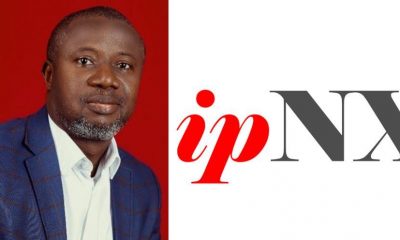Technology
FG to Slash Price of Mobile Data Below N400/1GB in Three Years

By Adedapo Adesanya
The federal government has said that it was targeting to cut the price of mobile data to less than N400 per gigabyte by 2025.
The Minister of Communications and Digital Economy, Mr Isa Pantami, said this while delivering a keynote address at a conference and exhibition of the Association of Telecommunications Companies of Nigeria (ATCON) in Abuja on Monday.
The programme was tagged National Strategic Mobilisation for the Actualisation of National Broadband Target of 70 per cent Conference and Exhibition themed, Realising the New Set Target of 70 per cent of Broadband Penetration.
Mr Pantami, who was represented by the Director of IT Infrastructure Solution Department, National Information Technology Development Agency (NITDA), Mr Usman Gambo Abdullahi, said broadband was the backbone of a digital economy.
He said that the event was aimed at x-raying the current level of broadband penetration, and consider areas of improvement, not only to achieve the 70 per cent broadband penetration but to exceed it.
“We are all aware that broadband supports the development of the digital economy and a focus on growing the national digital economy will also improve and diversify the nation’s traditional economy.
“The plan is carefully designed to deliver data download speeds across Nigeria. A minimum of 25Mbps in urban areas, and 10Mbps in rural areas.
“With effective coverage available to at least 90 per cent of the population by 2025 at a price not more than N390 per 1GB of data as well as the penetration rate of 70 per cent by 2025,” he said.
He said it had been identified by industry experts that a 10 per cent increase in broadband penetration would increase the Gross Domestic Product (GDP) of an economy by between 1.6 per cent and 4.6 per cent.
He recalled that as of July 2021, the broadband penetration was 39.79 per cent.
He added that the current evaluation of the broadband plan achievements so far revealed that as of the first quarter of 2022, broadband penetration stood at 42.27 per cent.
He said some of the challenges of broadband included multiple taxation and regulation, non-conformity with agreed Right-of-Way (RoW) charges, and difficulty in obtaining approvals and permits.
He said that burdensome taxes and levies were also some of the huge burdens on the industry and had stifled needed investment in telecommunication infrastructure.
He said that this steady increase was a result of relentless efforts made to address those challenges, but said the government was confident that the figure would continue to increase and surpass the set mid-term target of 50 per cent penetration by 2023.
“Our confidence in this is based on the strength of positive indices in 3G and 4G population coverage, which are presently at 83.65 per cent and 62.55 per cent respectively,” the minister said.
Mr Kashifu Inuwa, the Director-General of NITDA, in his paper, highlighted the agency’s contribution toward the demand of 70 per cent broadband penetration, which was NIRA free domain registration.
Mr Inuwa said this initiative sought to ensure collaboration between NIRA (.ng registry), NITDA and CAC toward getting more Nigerian businesses online by assigning a free .ng domain to every new business registered with CAC for the first two years.
He added that Digital Indigenous Language Contents was aimed at the development of digital content in local languages for citizen empowerment to leverage opportunities created by broadband, Digital Literacy Training and Awareness.
He said the goal of these initiatives was to develop or adopt an explicit Digital Literacy standard with coherent training and requisite certification for the duration of the plan.
“Our goal is to achieve at least one million developers with skills in various aspects of app development in the next 18 months.
“Our long-term objective is to champion the recalibration of the curriculum of institutions of higher learning, which remain the largest pipeline in the production of digital talent.
“It will ensure the implementation of the Nigeria e-Government Interoperability framework (Ne-GIF).
“The framework specifies concepts, principles, policies, recommendations, standards, and best practices for MDAs to work together towards cross-portfolio and seamless services delivery,” he said.
On his part, the President of ATCON, Mr Ikechukwu Nnamani, in his opening remarks, said that the event was an interactive session.
Mr Nnamani said this was something that would drive the country forward in a positive way and lead to development across all sectors of the economy.
“We are exploring and taking inventory of where we are in terms of the broadband target that has been set.
“We all know this is critical to the digital economy we are trying to build, which is why the broadband plan must be implemented and achieved,” he said.
The conference had panel sessions; the first session was on the state of broadband implementation in Nigeria.
The second session was on the Impact of Broadband Infrastructure on Over The Top (OTT) service providers, Fintech/e-commerce, equipment vendors, VAS providers, satellite operators, internet service providers, Manufacturers’ representatives, and Data Centre operators.
Technology
Telecom Operators to Issue 14-Day Notice Before SIM Disconnection

By Adedapo Adesanya
Telecommunications operators in Nigeria will now be required to give subscribers a minimum of 14 days’ notice before deactivating their SIM cards over inactivity or post-paid churn, following a fresh proposal by the Nigerian Communications Commission (NCC).
The proposal is contained in a consultation paper, signed by the Executive Vice Chairman and Chief Executive Officer of the NCC, Mr Aminu Maida, and titled Stakeholders Consultation Process for the Telecoms Identity Risks Management Platform, dated February 26, 2026, and published on the Commission’s website.
Under the proposed amendments to the Quality-of-Service (QoS) Business Rules, the Commission said operators must notify affected subscribers ahead of any planned churn.
“Prior to churning of a post-paid line, the Operator shall send a notification to the affected subscriber through an alternative line or an email on the pending churning of his line,” the document stated.
It added that “this notification shall be sent at least 14 days before the final date for the churn of the number.”
A similar provision was proposed for prepaid subscribers. According to the Commission, operators must equally notify prepaid customers via an alternative line or email at least 14 days before the final churn date.
Currently, under Section 2.3.1 of the QoS Business Rules, a subscriber’s line may be deactivated if it has not been used for six months for a revenue-generating event. If the inactivity persists for another six months, the subscriber risks losing the number entirely, except in cases of proven network-related faults.
The new proposal is part of a broader regulatory review tied to the rollout of the Telecoms Identity Risk Management System (TIRMS), a cross-sector platform designed to curb fraud linked to recycled, swapped and barred mobile numbers.
The NCC explained in the background section of the paper that TIRMS is a secure, regulatory-backed platform that helps prevent fraud stemming from churned, swapped, barred Mobile Station International Subscriber Directory Numbers in Nigeria.
It said this platform will provide a uniform approach for all sectors in relation to the integrity and utilisation of registered MSISDNs on the Nigerian Communications network.
In addition to the 14-day notice requirement, the Commission also proposed that operators must submit details of all churned numbers to TIRMS within seven days of completing the churn process, strengthening oversight and accountability in the system.
The consultation process, which the Commission said is in line with Section 58 of the Nigerian Communications Act 2003, will remain open for 21 days from the date of publication. Stakeholders are expected to submit their comments on or before March 20, 2026.
Technology
Silverbird Honours Interswitch’s Elegbe for Nigeria’s Digital Payments Revolution

By Modupe Gbadeyanka
The founder of Interswitch, Mr Mitchell Elegbe, has been honoured for pioneering Nigeria’s digital payments revolution.
At a ceremony in Lagos on Sunday, March 1, 2026, he was bestowed with the 2025 Silverbird Special Achievement Award for shaping Africa’s financial ecosystem.
The Silverbird Special Achievement Award recognises individuals whose innovation, vision, and sustained impact have left an indelible mark on society.
Mr Elegbe described the award as both humbling and symbolic of a broader journey, saying, “This honour represents far more than a personal milestone. It reflects the courage of a team that believed, long before it was fashionable, that Nigeria and Africa could build world-class financial infrastructure.”
“When we started Interswitch, we were driven by a simple but powerful idea that technology could democratise access, unlock opportunity, and enable commerce at scale.
“This recognition by Silverbird strengthens our resolve to continue building systems that empower businesses, support governments, and expand inclusion across the continent,” he said when he received the accolade at the Silverbird Man of the Year Awards ceremony attended by several other dignitaries, whose leadership and contributions continue to shape national development and industry transformation.
In 2002, Mr Elegbe established Interswitch after he was inspired by a bold conviction that technology could fundamentally redefine how value moves within and across economies.
Under his leadership, the company has evolved into one of Africa’s foremost integrated payments and digital commerce companies, powering financial transactions for governments, banks, businesses, and millions of consumers.
Today, much of Nigeria’s electronic payments ecosystem traces its foundational architecture to the systems and rails established under his leadership.
“Mitchell’s journey is inseparable from Nigeria’s digital payments evolution. His foresight and resilience helped establish foundational infrastructure at a time when the ecosystem was still nascent.
“This recognition affirms not only his personal legacy, but the broader impact of Interswitch in enabling commerce and strengthening financial systems across Africa,” the Executive Vice President and Group Marketing and Communications for Interswitch, Ms Cherry Eromosele, commented.
Technology
SERAP Seeks FCCPC Probe into Big Tech’s Impact on Nigeria’s Digital Economy

By Adedapo Adesanya
The Socio-Economic Rights and Accountability Project (SERAP) has called on the Federal Competition and Consumer Protection Commission (FCCPC) to urgently investigate major global technology companies over alleged abuses affecting Nigeria’s digital economy, media freedom, privacy rights and democratic integrity.
In a complaint addressed to the chief executive of FCCPC, Mr Tunji Bello, the group accused Google, Meta (Facebook), Apple, Microsoft (Bing), X, TikTok, Amazon and YouTube of deploying opaque algorithms and leveraging market dominance in ways that allegedly undermine Nigerian media organisations, businesses, and citizens’ rights.
The complaint, signed by SERAP Deputy Director, Mr Kolawole Oluwadare, urged the commission to take measures necessary to urgently prevent further unfair market practices, algorithmic influence, consumer harm and abuses of media freedom, freedom of expression, privacy, and access to information.”
SERAP also asked the FCCPC to convene a public hearing to investigate allegations of algorithmic discrimination, data exploitation, revenue diversion, and anti-competitive conduct involving the tech giants.
According to the organisation, dominant digital platforms now act as private gatekeepers of Nigeria’s information and business ecosystem, wielding enormous influence over public discourse and market competition without sufficient transparency or regulatory oversight.
“Millions of Nigerians rely on these platforms for news, information and business opportunities,” SERAP stated, warning that opaque algorithms and offshore revenue extraction models pose both economic and human rights concerns.
The group argued that the alleged practices threaten media plurality, consumer protection, privacy rights, and the integrity of Nigeria’s forthcoming elections.
SERAP pointed to actions taken by the South African Competition Commission, which investigated Google over alleged bias against local media content, adding that the South African probe reportedly resulted in measures including algorithmic transparency requirements, compliance monitoring and financial remedies.
SERAP urged the FCCPC to take similar steps to safeguard Nigerian media and businesses.
The organisation maintained that if established, the allegations could amount to violations of Sections 17 and 18 of the Federal Competition and Consumer Protection Act (FCCPA), which prohibit abuse of market dominance and anti-competitive conduct.
SERAP stressed that the FCCPC has statutory authority to investigate and sanction conduct that substantially prevents, restricts or distorts competition in Nigeria.
It also warned that failure by the Commission to act promptly could prompt the organisation to pursue legal action to compel regulatory intervention.
Citing concerns reportedly raised by the Nigerian Press Organisation (NPO), SERAP said big tech companies have fundamentally altered Nigeria’s information environment, creating what it described as a structural imbalance of power that threatens the sustainability of professional journalism.
Among the allegations listed are: Algorithms controlled outside Nigeria determining content visibility, monetisation of Nigerian news content without proportionate reinvestment, offshore extraction of advertising revenues, limited discoverability of Nigerian websites and platforms, and lack of transparency in ranking and recommendation systems.
SERAP argued that declining revenues in the Nigerian media industry have led to shrinking newsrooms, closure of bureaus, and the emergence of news deserts, weakening journalism’s constitutional role in democratic accountability.
The organisation further warned that algorithmic opacity and data-driven micro-targeting could influence voter exposure to information ahead of Nigeria’s forthcoming elections, raising concerns about electoral fairness and transparency.
-

 Feature/OPED6 years ago
Feature/OPED6 years agoDavos was Different this year
-
Travel/Tourism10 years ago
Lagos Seals Western Lodge Hotel In Ikorodu
-

 Showbiz3 years ago
Showbiz3 years agoEstranged Lover Releases Videos of Empress Njamah Bathing
-

 Banking8 years ago
Banking8 years agoSort Codes of GTBank Branches in Nigeria
-

 Economy3 years ago
Economy3 years agoSubsidy Removal: CNG at N130 Per Litre Cheaper Than Petrol—IPMAN
-

 Banking3 years ago
Banking3 years agoSort Codes of UBA Branches in Nigeria
-

 Banking3 years ago
Banking3 years agoFirst Bank Announces Planned Downtime
-

 Sports3 years ago
Sports3 years agoHighest Paid Nigerian Footballer – How Much Do Nigerian Footballers Earn

















